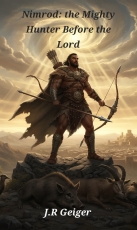
Book by: J.R. Geiger
Genre: Non-Fiction
The walls of Babel rose higher year by year, solidifying Nimrod’s success. The city, once a symbol of security, began to transform into a monument of self-sufficiency. The initial gratitude for shelter morphed into pride in their own ingenuity. “Beware lest you say in your heart, ‘My power and the might of my hand have gotten me this wealth’” (Deuteronomy 8:17). The people who had once looked to the horizon for God’s leading now looked only to the top of their brick towers for validation.
The Shadow in the Clay
Nimrod observed the change with dread. The practical necessity of building had become an ideological pursuit. Discussions once focused on irrigation and defense now centered on reaching new heights. The people began to boast, not of the covenant made with Noah, but of the massive scale of their own creation.
“Then they said, ‘Come, let us build ourselves a city and a tower with its top in the heavens, and let us make a name for ourselves’” (Genesis 11:4).
The first time the idea of a tower reaching the heavens was proposed, Nimrod felt a coldness settle in his heart. This was not defense—it was pride rising again, smelling of the arrogance the Flood had washed away.
He called a convocation of elders and builders. Standing before the immense clay structures, Nimrod spoke plainly:
“We are protected here. We have food, walls, and the word of the Lord. But this ambition—to build a structure that rivals the sky—is not stewardship. It is defiance. ‘Do not be deceived: God is not mocked’ (Galatians 6:7). We are built on His grace, not on our own fired clay.”
He warned them: “If we pursue this path, the security we have built will become our downfall. We must stop this venture and focus on expanding in breadth across the land, as we were commanded, not in height in one place.”
The Parting of Ways
The reaction was dismissive. They respected Nimrod the Hunter, but no longer felt urgency about the covenant. They had traded faith for engineering.
One builder spoke for the majority: “King Nimrod, your strength secured us. But look at what we have made! Why should we wander when we can build a monument that will secure our name forever?”
Nimrod saw the fracture. He realized he could secure walls, but not hearts. The city of Babel had become greater than the God who saved its founders.
Faced with this schism, Nimrod made his choice. He would not command the tower, nor would he stop it. He would not crush free will. “I have set before you life and death, blessing and curse. Therefore choose life” (Deuteronomy 30:19). Nimrod would not be the tyrant they seemed to want.
He called those who clung to the covenant. As the tower rose, Nimrod turned his back on the walls. He gathered his loyalists, those who knew pride leads only to separation.
He took only what he could carry, leaving behind the vast kingdom he had forged. Nimrod, the mighty hunter, walked east again, leading a small band of the faithful out from the shadow of Shinar. “The beginning of his kingdom was Babel… From that land he went into Assyria and built Nineveh” (Genesis 10:10–11).
He went on to found the next city—not on self-glorification, but on humble stewardship of the earth.
© Copyright 2026 J.R. Geiger. All rights reserved.
Regular reviews are a general comments about the work read. Provide comments on plot, character development, description, etc.
In-line reviews allow you to provide in-context comments to what you have read. You can comment on grammar, word usage, plot, characters, etc.
I am enjoying this interpretation of what happened to Nimrod. I think though that things can be interpreted in another way. The god Nimrod is following, is the same one that killed everything. It seems that Nimrod's followers realised they were capeable of doing things for themselves without relying on a deity to do it for them. Maybe this is what pisses their god again and leads to their destruction. On another note, If you've ever read Hitchhikers Guide to the Galaxy you will be pleased to learn that a small fish acts as a universal interpreter and its called the Babel Fish.
I hope Nimrod gets a more peaceful city in the next attempt.
Morag Higgins